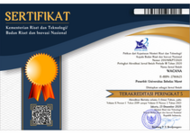Pengaruh Antara Health Belief Model dengan Perilaku Kepatuhan terhadap Protokol Kesehatan
Abstract
Pandemi Covid-19 yang sudah terjadi dua tahun telah membuat masyarakat melakukan kegiatan preventif untuk menjauhi diri dari virus Covid-19. Salah satu kegiatan preventif yang dilakukan adalah dengan mematuhi protokol kesehatan yang telah disusun oleh WHO. Untuk melakukannya, masyarakat butuh kepercayaan. Kepercayaan ini disebut Health Belief Model. Riset ini menunjukkan pengaruh dari belief kepada perilaku kepatuhan terhadap protokol kesehatan. Hasilnya 31,1% belief dapat membentuk perilaku kepatuhan terhadap protokol kesehatan, dengan perceived benefit sebagai dimensi signifikan. Dengan itu, menjadi penting bagi pemerintah untuk memberikan aksi yang dapat membuat masyarakat percaya dan akhirnya lebih patuh terhadap protokol kesehatan sehingga pandemi Covid-19 dapat berakhir.
Keywords
Full Text:
PDF (Bahasa Indonesia)References
Abraham, C., & Sheeran, P. (2015). The Health Belief Model. New York: Open University Press.
Afro, R. C., Isfiya, A., & Rochmah, T. N. (2020). Analisis Faktor yang Mempengaruhi Kepatuhan Terhadap Protokol Kesehatan saat Pandemi Covid-19 Pada Masyarakat Jawa Timur: Pendekatan Health Belief Model. Journal of Community Mental Health and Public Policy, 1-10. https://doi.org/10.51602/cmhp.v3i1.43
Agatha, A. A., & Bratadiredja, M. A. (2019). Review: Faktor Yang Mempengaruhi Kepatuhan Pasien Dalam Pengobatan TBC Paru. Farmaka, 385-389.
Antarajatim. (2020, December 4). Tingkat Kepatuhan Masyarakat Memakai Masker Hanya 59,32 Persen. https://jatim.antaranews.com/berita/437128/tingkat-kepatuhan-masyarakat-memakai-masker-hanya-5932-persen
Australian Government Department of Health. (2020). What You Need To Know About Coronavirus (COVID-19). https://www.health.gov.au/news/health-alerts/novel-coronavirus-2019-ncov-health-alert/what-you-need-to-know-about-coronavirus-covid-19 accessed September 2021
Balkhy, H. H., Abolfotouh, M. A., Al-Hathlool, R. H., & Al-Jumah, M. A. (2010). Awareness, attitudes, and practices related to the swine influenza pandemic among the Saudi public. BMC infectious diseases, 10(1), 1-7. https://doi.org/10.1186/1471-2334-10-42
Bechard, L. E., Bergelt, M., Neudorf, B., DeSouza, T. C., & Middleton, L. E. (2021). Using the Health Belief Model to Understand Age Differences in Perceptions and Responses to the COVID-19 Pandemic. Frontiers in psychology, 12, 1216. https://doi.org/10.3389/fpsyg.2021.609893
Becker, M. H. (1974). The Health Belief Model and Sick Role Behavior. Health Education Monographs, 409-419. https://doi.org/10.1177/109019817400200407
Buglar, M. E., White, K. M., & Robinson, N. G. (2010). The Role of Self-Efficacy in Dental Patients' Brushing and Flossing: Testing an Extended Health Belief Model. Patient Education and Counseling, 269-272. https://doi.org/10.1016/j.pec.2009.06.014
Chan JF-W, Yuan S, Kok K-H, To KK-W, Chu H, Yang J, et al. A familial cluster of pneumonia associated with the 2019 novel coronavirus indicating person-to-person transmission: a study of a family cluster. The Lancet. 2020;395:514–23. https://doi.org/10.1016/S0140-6736(20)30154-9
Dong E, Du H, Gardner L. An interactive web-based dashboard to track COVID-19 in real time. Lancet Inf Dis. 20(5):533-534. https://doi.org/10.1016/S1473-3099(20)30120-1
Duarsa, A. B. S., Mardiah, A., Hanafi, F., Karmila, D., & Anulus, A. (2021). Health belief model concept on the prevention of coronavirus disease-19 using path analysis in West Nusa Tenggara, Indonesia. International Journal of One Health, 31-36. https://doi.org/10.14202/IJOH.2021.31-36
Feldman, R. S. (2003). Essentials of Understanding Psychology. New York: Mcgraw-Hill Companie.
Hall, K. S. (2011). The Health Belief Model Can Guide Modern Contraceptive Behavior Research and Practice. Journal of Midwifery & Women's Health, 74-81. https://doi.org/10.1111/j.1542-2011.2011.00110.x
Heni, A. (2020, June 3). Analisis Penyebab Masyarakat Tidak Patuh Pada Protokol Covid-19. https://theconversation.com/analisispenyebab-masyarakat-tidak-patuh-padaprotokol- covid-19-138311
Jose, R., Narendran, M., Bindu, A., Beevi, N., Manju, L., & Benny, P. V. (2021). Public perception and preparedness for the pandemic COVID 19: a health belief model approach. Clinical Epidemiology and Global Health, 9, 41-46. https://doi.org/10.1016/j.cegh.2020.06.009
Joseph, G., Burke, N. J., Tuason, N., Barker, J. C., & Pasick, R. J. (2009). Perceived Susceptibility to Illness and Perceived Benefits of Preventive Care: An Exploration of Behavioral Theory Constructs in a Transcultural Context. Health Education Behavior, 71-90. https://doi.org/10.1177/1090198109338915
Junita, N. (2021, July 27). Berjibaku Mengatasi Pandemi Covid-19, di Antara Hoaks dan Kepatuhan. https://kabar24.bisnis.com/read/20210727/15/1422200/berjibaku-mengatasi-pandemi-covid-19-di-antara-hoaks-dan-kepatuhan
Kelman, H. (1958). Compliance, identification, and internalization: Three processes of attitude change. Journal of Conflict Resolution, 2 (1): 51–60. https://doi.org/10.1177/002200275800200106
Kurnia, A. D., Masruroh, N. L., Melizza, N., & Rofi’i, A. Y. A. (2021). Factors associated with preventive behaviors of COVID-19 among Indonesian nursing students: application of Health Belief Model. Russian Open Medical Journal, 6-6.
Lahiry, S., Karmakar, R., & Parameswaran, S. (2020). Using Health Belief Model, TriRisk Model, and Fatalism to Predict COVID-19 Social Distancing Compliance Behavior. Cambridge Open Engage, 1-29. doi:10.17759/sps.2021120408
Purnama, R.D. (2021, August 4). Covid-19 Naik! Mari ketat Protokol Kesehatan dengan 6M www.kompasiana.com/raihan92770/610a8837a1130e7830046aa2/covid-19-naik-mari-ketat-protokol-kesehatan-dengan-6m.
NIH Research. (2011). Flu Pandemic 2011. National Institute of Health
Notoatmodjo, S. (2007). Kesehatan Masyarakat: Ilmu & Seni. Jakarta: Rineka Cipta.
Nursyamsi, A. (2021, August 11). Kepatuhan Masyarakat Jalankan Protokol Kesehatan Meningkat Selama PPKM Dapatkan Skor 7,84. https://www.tribunnews.com/corona/2021/08/11/kepatuhan-masyarakat-jalankan-protokol-kesehatan-meningkat-selama-ppkm-dapatkan-skor-784
Onoruoiza, S. I., Musa, A., Umar, B. D., & Kunle, Y. S. (2015). Using Health Beliefs Model as an Intervention to Non Compliance with Hypertension Information among Hypertensive Patient. Journal of Humanities and Sosial Science, 11-16.
Prasetyo, A. (2021, July 30). Kepatuhan Protokol Kesehatan Masih Rendah, Zona Merah dan Kasus Kematian Bertambah. https://insight.kontan.co.id/news/kepatuhan-protokol-kesehatan-masih-rendah-zona-merah-dan-kasus-kematian-bertambah
Puspitasari, A. D., & Hendrati, L. Y. (2013). Hubungan Antara Faktor Pengemudi Dan Faktor Lingkungan Dengan Kepatuhan Mengendarai Sepeda Motor. Jurnal Berkala Epidemiology, 192-200.
Rosenstock, I. M. (1974). The Health Belief Model and Preventive Health Behavior. Health Education Monographs, 2(4), 354–386.
Shahnazi, H., Ahmadi-Livani, M., Pahlavanzadeh, B., Rajabi, A., Hamrah, M. S., & Charkazi, A. (2020). Assessing preventive health behaviors from COVID-19: a cross sectional study with health belief model in Golestan Province, Northern of Iran. Infectious diseases of poverty, 9(1), 157. https://mednexus.org/doi/full/10.1186/s40249-020-00776-2
Widarti, P. (2020, December 2). Kepatuhan Protokol Kesehatan Lima Kabupaten Di Jatim Masih Rendah. https://surabaya.bisnis.com/read/20201202/531/1325341/kepatuhan-protokol-kesehatan-lima-kabupaten-di-jatim-masih-rendah
Suluh, M. G. (2021). Pendekatan Health Belief Model dalam Penerapan Protokol Kesehatan Masa Pandemi Covid-19 Di Kabupaten Kupang. Kupang: UPT Perpustakaan Undana.
World Health Organization. (2020). ‘Rolling updates on coronavirus disease (Covid-19)’. https://www.who.int/emergencies/diseases/novel-coronavirus-2019/events-as-they-happen
World Health Organization. (2020). Corona virus disease (Covid 19) pandemic. https://www.who.int/emergencies/diseases/novel-coronavirus-2019,
DOI: https://doi.org/10.20961/wacana.v15i1.60440
Refbacks
- There are currently no refbacks.
Copyright (c) 2023 Rizky Wicaksono

This work is licensed under a Creative Commons Attribution-ShareAlike 4.0 International License.
Jurnal WACANA
Fakultas Psikologi Universitas Sebelas Maret (UNS)
Gedung D Fakultas Psikologi
Jl. Ir. Sutami 36A Kentingan, Jebres, Surakarta Jawa Tengah 57126
email : wacana@mail.uns.ac.id






